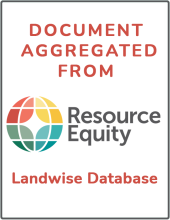Land Library
Bienvenue dans la bibliothèque du Land Portal. Explorez notre vaste collection de ressources en libre accès (plus de 74 000), comprenant des rapports, des articles scientifiques, des articles de recherche, des publications évaluées par des pairs, des documents juridiques, des vidéos et bien plus encore.
/ library resources
Showing items 1 through 9 of 89."Like many developing countries, China and India followed development strategies biased in favor of the urban sector over the last several decades. These development schemes have led to overall efficiency losses due to misallocation of resources among rural and urban sectors.
This report investigates how Dutch public money is being used to support oil production in developing countries through Multilateral Development Banks (MDBs) such as the World Bank and European Bank for Reconstruction and Development (EBRD), and other International Financial Institutions (IFIs).
UK aid money is creating an "oil curse" for developing economies, according to this new report published by Friends of the Earth, Plan B and Platform Research. Pumping Poverty accuses DFID of an aid policy that is incoherent, fails the people it is design
Informal systems for land delivery, which have in many cases evolved from earlier customary practices, still account for over half the land supplied for housing in African cities and are a particularly important channel for the poor.
Institutions of collective action and systems of property rights shape how people use natural resources, and these patterns of use in turn affect the outcomes of people’s agricultural production systems.
En el mundo entero, los gobiernos buscan cada vez más gestionar sus bosques con la colaboración de la gente que vive cerca de ellos.
The government of Uganda, with help from its development partners, is designing and implementing policies and strategies to address poverty, land degradation, and declining agricultural productivity.
This study investigates the impacts of rural poverty on farmers’ land management decisions, crop production and incomes, based upon analysis of data from the 1999/2000 Uganda National Household Survey.







